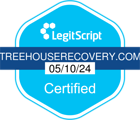Although it would be great if recovery were a steady climb from despair to hope, it rarely goes that smoothly. There are always setbacks and unexpected challenges. One especially frustrating challenge is when you find yourself in a rut. Things aren’t exactly bad, but you don’t seem to be making progress either. Maybe you feel lost or stuck. Sometimes this happens because recovery is going a little too well and you starting to take it for granted. Or perhaps you expected much more and you’re feeling disappointed that your hard work hasn’t yielded better results. Either way, a rut can be dangerous. It can lead to negative emotions, cutting corners in your recovery, and eventually instigate thoughts of using again. If you’re feeling stuck in your recovery, here are three tips to get you moving forward again.
Get Vocal About Where You Are At
One common sign of emotional relapse — the first step on the path to physical relapse — is that you start bottling up emotions. Your frustrations and resentments pile up, leaving you feeling worse and worse. Consider this a sign to reverse course quickly by bringing your struggles and frustrations to your therapist or support group. It’s fine if you can’t quite articulate what’s wrong. You can start by giving your general impressions. What really matters is that you are making an effort to open up. Often, people feel stuck because of issues they haven’t dealt with that are blocking their progress. Talking things over with your therapist is always a good first step. If you don’t have a therapist or therapy group, sharing at a 12-step meeting or with a friend can help.
Try Something New
Routines are important in recovery because they provide stability, minimize stress, and automate healthy decisions. However, months of sticking to a healthy routine can become monotonous. If you feel stuck or adrift, it may be time to add something new. Making a small change, like taking a different route to work or eating at a new restaurant for lunch, or bigger changes, like taking up a new hobby or working towards a promotion at work, are all great ways to initiate progress in your recovery. Trying new things changes your perspective and gives you a sense of control over your life, while simultaneously pushing you to grow out of your comfort zone.
Pay Attention to Self-Care
Another common symptom of emotional relapse is lack of self-care. Self-care is the practice of showing up for your mental/emotional, physical and spiritual needs towards supporting your recovery a day at a time. When people find themselves in a rut and start taking recovery for granted, they often begin thinking along the lines of, “I’ve been doing fine for months; I don’t have to go to meetings anymore.” Similar thought patterns can be observed around other self-care and recovery behaviors, including dietary choices, commitment to physical activity and spirituality. Forgetting what life was like before the decision to implement positive lifestyle changes is common, and creates a tendency towards slacking off. If you’re feeling dissatisfied with recovery or life in general, have a look at your self-care habits and try getting back to what works.
Looking for Help?
Recovery from addiction isn’t linear. Remember that it’s absolutely normal to take two steps forward and one step back. A quality treatment program can help you create good habits that you can maintain long-term through positive lifestyle changes and a strong support system. At Tree House Recovery of Orange County, we help men recover from addiction by helping them create healthier lives. To learn more, call us today at 855-202-2138.






